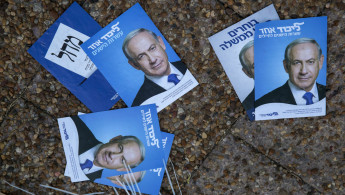US warns it may withdraw diplomatic support for Israel
What has traditionally been one of the world's tightest diplomatic alliances could be under threat, as the White House hints at re-evaluating its relationship with Israel following Netanyahu's election victory.
3 min read
Netanyahu's speech in Congress was said to have angered the US president [Getty]
A decades-long alliance between Israel and the United States could be fundamentally changed after the White House warned it could withdraw crucial diplomatic cover for Tel Aviv at the United Nations.
It comes after Binyamin Netanyahu seized an election victory yesterday to stay on as Israel's prime minister for a fourth term. His campaign had been marked by what analysts dubbed "racist scaremongering".
Netanyahu's right-wing Likud Party looks set to form an alliance with far-right religious parties, and has pledged to block any attempts to establish an independent Palestinian state.
"Steps that the United States has taken at the United Nations had been predicated on this idea that the two-state solution is the best outcome," said White House press secretary Josh Earnest.
"Now our ally in these talks has said that they are no longer committed to that solution. That means we need to reevaluate our position in this matter, and that is what we will do moving forward."
The United States is a member of the United Nations Security Council, and has frequently used its veto to block measure that might allow for the recognition of a Palestinian state.
The Israeli prime minister did attempt to backtrack on his earlier remarks on Thursday.
"I don't want a one-state solution. I want a sustainable, peaceful two-state solution, but for that, circumstances have to change," Netanyahu told MSNBC.
"America has no greater ally than Israel, and Israel has no greater ally than the United States," he said.
Washington has been a reliable partner for Israel and used its influence to provide diplomatic cover at the UN's highest body, despite massive condemnation from other UN member states about Tel Aviv's occupation of the West Bank, blockade of Gaza, "disproportionate" use of force, and other human rights abuses.
| We need to reevaluate our position in this matter, and that is what we will do - Josh Earnest, White House press secretary |
Since 1962, the US has provided Israel with close to $100 billion in military aid; in recent years this has amounted to $3 billion a year.
Diplomatic damage
Palestinian chief negotiator Saeb Erakat told AFP in the wake of Tuesday's vote that they would "speed up, pursue and intensify" diplomatic efforts aimed at winning international recognition.
Despte Netanyahu's bid to contain the diplomatic damage on Thursday night, the White House said that no policy decisions had yet been made, but sharply noted that US decisions in the past had "protected Israel from isolation in the international community."
Netanyahu's vitriolic language about Palestinians during his election campaign was said to have particularly rankled Washington.
"What is apparent is that in the context of the campaign, and while he was the sitting prime minister of Israel, he walked back from commitments that Israel had previously made to a two-state solution," Earnest said.
President Obama, who has reportedly yet to call Netanyahu to congratulate him, already had cool relations with his Israeli counterpart even before his remarks about Palestinians.
Obama is said to be frustrated by the Israeli PM's frequent attacks on his push to find a solution in nuclear talks with Iran.
This culminated in a boycott of Netanyahu's speech to the US Congress by members of the president's party, when the Israeli leader attacked a nascent deal with Tehran that has been a cornerstone of Obama's foreign policy.
Washington has also long been frustrated by Netanyahu's support for the continued construction of settlements - deemed illegal under international law - in the occupied West Bank.





 Follow the Middle East's top stories in English at The New Arab on Google News
Follow the Middle East's top stories in English at The New Arab on Google News
![Israeli forces ordered bombed Gaza's Jabalia, ordering residents to leave [Getty]](/sites/default/files/styles/image_330x185/public/2176418030.jpeg?h=a5f2f23a&itok=_YGZaP1z)

